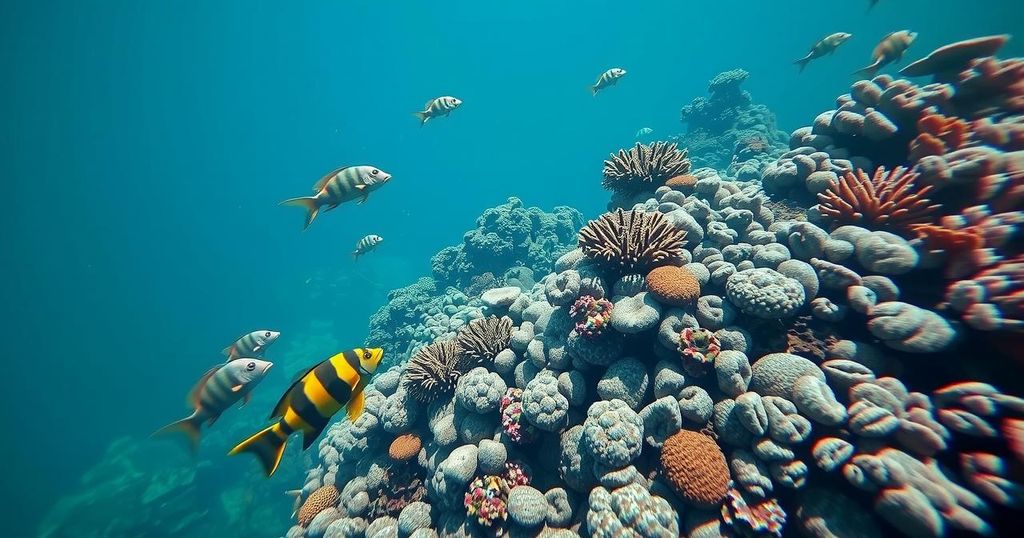The United Nations has called for increased funding to protect coral reefs, which are severely impacted by extensive bleaching due to climate change. An emergency session was held to address this crisis during COP16 in Colombia, leading to new financial pledges totaling $30 million from several countries. Coral reefs, crucial to marine biodiversity and human livelihoods, face extinction without urgent action and collaboration, as exemplified by significant bleaching events in major reef systems.
The United Nations, in collaboration with scientists and governmental representatives, convened an emergency session to discuss the alarming state of the world’s coral reefs, highlighting the urgent need for enhanced funding for their protection amidst ongoing threats of extinction. Recent research indicates that a staggering 77% of global coral reefs are currently impacted by bleaching, a phenomenon primarily attributed to rising ocean temperatures resulting from anthropogenic climate change. This event constitutes the fourth and most extensive mass coral bleaching recorded to date, affecting both hemispheres, as reported by the United Nations Capital Development Fund. The emergency session is a notable part of the UN biodiversity summit, known as COP16, which is taking place in Cali, Colombia. Coral reefs, which are essential ecosystems that harbor over 25% of marine species and nearly one billion human beings reliant on them for food security, coastal protection, and economic livelihood, are under severe threat according to UN reports. In the aftermath of the emergency session, the governments of New Zealand, the United Kingdom, Germany, and France pledged a total of approximately $30 million to the United Nations’ coral reefs fund, which was established in 2020. This initiative aspires to mobilize up to $3 billion by 2030 in public and private funding for coral reef conservation. Currently, the fund has successfully raised around $225 million. “Protecting our ocean and its precious habitats is fundamental to life on earth,” stated Mary Creagh, the U.K. Minister for Nature. “But without urgent action, the world’s coral reefs face extinction from global heating, acidification, disease, and pollution; a vital ecosystem lost within our lifetime.” Looking ahead, a forthcoming U.N. ocean conference is scheduled for Nice, France, with delegates urged to contribute more to the coral reef fund, aiming to generate an additional $150 million prior to the conference. “In 2024, climate change and other human impacts triggered the fourth mass coral reef bleaching event, the most extensive and devastating on record,” remarked Peter Thomson, the U.N. Secretary-General’s Special Envoy for the Ocean. “With the window to protect these ecosystems closing rapidly, world leaders must act now. We must secure a sustainable future for coral reefs and the countless lives that rely on them — before it is too late.” Coral reefs experience bleaching due to elevated water temperatures, which cause them to expel algae that provide vital nutrition, resulting in color loss and stress. Bleaching can also be triggered by excessively low tides, pollution, or extreme sunlight exposure. Significant bleaching events have been reported in major coral ecosystems, including Australia’s Great Barrier Reef, where 90% of the assessed coral was affected as of 2022, and the Florida Coral Reef, the third-largest globally. David Obura, a renowned marine ecologist from Kenya, noted the alarming trend of prolonged bleaching events: “They are lasting more than one year at a time, which is worrying,” he expressed during the U.N. emergency session at COP16.
Coral reefs are under significant threat from climate change and anthropogenic activities, leading to mass bleaching events that endanger these critical ecosystems. The recent findings emphasize a global crisis facing coral reefs, and collective actions from governments and international organizations are crucial to mitigate the impacts and protect these vital marine environments. Understanding the importance of these ecosystems, which support marine biodiversity and human livelihoods, underlines the urgency of the situation.
In conclusion, the fourth mass coral bleaching event represents a critical ecological crisis that necessitates immediate and coordinated action from global leaders and conservation organizations. Continued funding and international cooperation are essential to safeguard coral reefs, which are indispensable to marine biodiversity and coastal communities worldwide. Urgent commitments from nations signify a step towards addressing the peril facing coral ecosystems, highlighting the imperative to protect them for future generations.
Original Source: www.voanews.com







